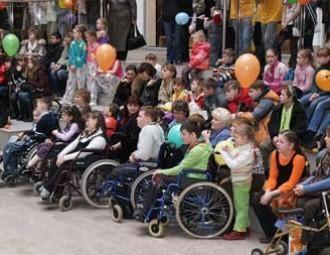Siarhei Drazdouski: the state buries its head in the sand and does not see discrimination

Belarus is in favor for the joining to the Convention on the Rights of Persons with Disabilities, but there is still no legal clarity about the concept of discrimination.
On April 18 an international conference “Topical questions of legal realization of equality ensuring principles. European experience: from theory to practice” will be held in Minsk. Enlightenment Human Rights Establishment “Office for the Rights of People with Disabilities” in collaboration with Rosa Luxembourg Foundation will act as coordinators of the event. On the threshold of the event coordinator of Office for the Rights of People with Disabilities Siarhei Drazdouski told the EuroBelarus information service what is to expect from the event and what issues are going to be discussed.
As Siarhei Drazdouski says there is still no clear legislative definition of discrimination in Belarusan legislation.
“We often make statements and see similar statements in press that this or that thing is discriminatory, that this or that person has fallen victim to discrimination. In the scope of the Belarusan law it is a nonsense, as no other legal documents except the statement in the Constitution of the Republic of Belarus about the equality and fraternity give the definition to discrimination”,- says Siarhei Drazdouski. At the same time lawyers of the international law and foreign lawyers give a perfectly accurate definition to the term and they determine its principles and its place in the society.
They build definite legal relations which implement the state policy in such a way that every citizen is secure against discrimination. And also in case of discrimination every citizen has a right for full legal defense.
“The society has to be sure that the next political line includes the principle of nondiscrimination as one of the basic,” – continues the expert.
It is important to understand that the negligent attitude of the Belarusan society affects people. “The myth about the tolerance of the Belarusans we are trying to cultivate is just an idol everybody prays to, - claims the coordinator of the Office for the Rights of People with Disabilities. – The Government simply buries its head in the sand and says that there is no discrimination in our country. Although social science, psychology and law point that discrimination is a feature of any society.” The denial of discrimination causes the conditions which are not seen on the surface, but in general they influence the society by splitting it up. “Discrimination in the society is differentiation between ‘we’ and ‘you’, this is a division inside our communities. And, in the final analysis, it is a free genocide. But everything begins with small things such as not taking into account opinions of minorities’, - says the specialist.
The main reason why the conference on discrimination is devoted exactly to the problem of disability is that Belarus for another time manifested its legislative initiative to join the Convention on the Rights of Persons with Disabilities. In this document the definition of discrimination and the protection against it are accurately described. The adoption of this Convention will become a certain landmark for the Belarusan legislation. The support for both legal and implementing mechanisms will be needed. “At the conference we are going to keep the problem of disability in focus exactly because it is the most understandable and closest problem for all. At the same time we hold to a position that it is impossible to only resolve the problem of disabilities discrimination while all the other issues will remain unsolved”, - says Siarhei Drazdouski.
The conference will touch upon general matters of law, relations, progressive practices of the Council of Europe, Germany and Ukraine. The role of the society and the government in this problem will also be discussed. The ultimate priority for the coordinators of the conference is to make the participants to come up with suggestions that could become a strategy for Belarus how to implement principles of freedom from discrimination.
The conference is supposed to work through the issue of both legal adjustments of discrimination and public attitude to the problem. Discrimination should be examined from the position of law and from the position of society. Only by uniting all the efforts in both directions it is possible to get positive results.
The majority of experts who take part in the conference are practitioners and they are ready to share their experience in this sphere. In the end of the conference expert reports will be published. “We think that the conference is the first step that allows us to gather and to discuss professionally the burning issues. We hope it will become an instrument for the next steps in the field of discrimination,”- Siarhei Drazdouski expressed his expectations.
-
03.01
-
07.10
-
22.09
-
17.08
-
12.08
-
30.09



























